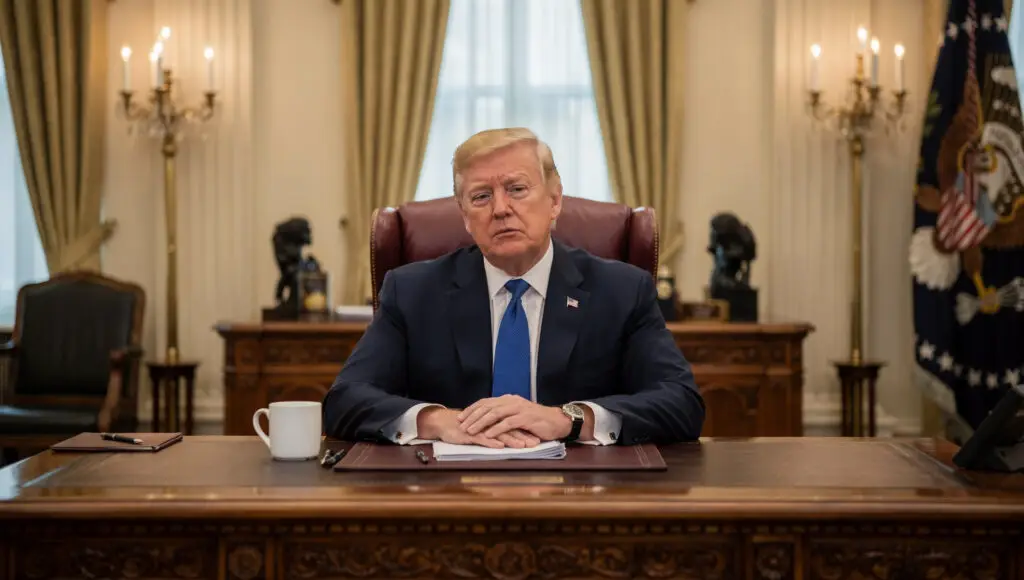The cryptocurrency market took a huge hit on Friday following President Donald Trump’s tariff announcement, which sent shockwaves across the globe. Bitcoin and other major cryptocurrencies suffered a sharp price decline, which indicates the cryptocurrency market’s fearful sentiment toward a potential economic recession.
“Liberation Day”—Global Market Shock
President Trump’s proclamation of April 2nd as “Liberation Day” and the announcement of a 10% baseline tariff on all U.S. imports along with increased duties on certain trade partners sent markets into a frenzy. The rhetoric used to justify the policies as measures to counter “unfair trade practices” created additional strife in traditional and digital asset markets simultaneously.
Stock Market Plummets: 2022 Losses Revisited
Global equities did not react well to the tariff news and U.S. stocks followed suit after a loss in Asia and Europe. The S&P 500, a major metric of market health, fell into correction territory once again, losing almost $2 trillion in market cap. In addition, this was the index’s worst single-day plunge since September 2022, which further demonstrated the magnitude of the market’s reaction.
Deutsche Bank’s Warning: Economic Fallout
One of the greatest concerns surrounding these tariffs involves the potential economic impacts. Deutsche Bank has issued a dire warning that the tariffs could cut between 1 and 1.5 percent off the U.S. GDP for this year. This estimation illustrates the possibility of the tariffs having a profoundly negative effect on the economy and economic growth.
A Decline in the Crypto Market: Crypto’s Contagion
This negative sentiment impacted the cryptocurrency market. For a brief moment, Bitcoin plummeted to $82,000, and the crypto market saw a decline. Other major players like Ethereum (ETH), XRP, and Solana (SOL) also recorded losses. The ETH/BTC ratio, which is an important measure of altcoin performance, reached a low level not seen since June 2020 before recovering slightly.
Potential Volatility and Uncertainty: Market Outlook
Ultra’s CEO, Gus van Rijckevorsel, expects that the market will continue being plagued with the consequences of Trump’s tariff strategy in the second quarter and potentially in the summer. He predicts that Trump will, at some point, resume talks, but only after the market has been through a tumultuous phase. Inflation and Budget Concerns: Raising Market Concerns
The impact of trade tariffs on trade, interest rates, and even investor appetite is gaining concern from traders and market specialists alike. Co-founder of WeFi, Maksym Sakharov, warns that inflation can be worsened by the tariffs, which in turn makes it harder for the Federal Reserve to lower the interest rates. Additionally, the upcoming budget debate in Washington is a source of market angst due to the possibility of a funding freeze lacking a debt ceiling agreement.
Bitcoin’s Sensitivity: Risk-Off Market Environments
It has been noted in the past that Bitcoin does not exhibit the same movements as the underlying markets. They note that bitcoin has inflating movements as well as deflating ones, and for the moment, it looks like it is inflating, which comes from slower risk-off sentiment across the market. Chief of markets at YouHodler, Ruslan Lienkha, expects selling pressure from the stock markets to spill into crypto commodities. Although he expects no serious short-term sell-off, he also concedes that the market is overall pessimistic.
Navigating a Turbulent Landscape Conclusion
Due to present President Trump’s imposed tariffs, the cryptocurrency industry is undergoing an unprecedented period of turmoil, with concern about a global economic downturn. Investors are actively waiting to see the consequences of these events on both conventional and virtual assets in the foreseeable future. The most salient points are that, at this moment, the two economies, the global economy and the crypto market, are symbiotic in nature, requiring frequent observations.













